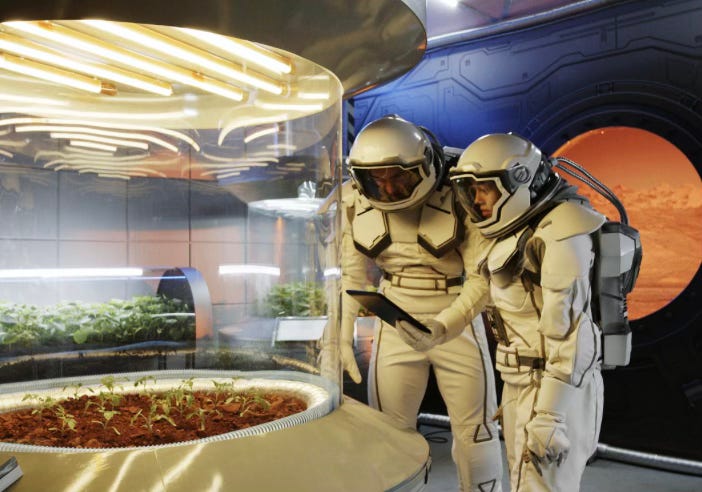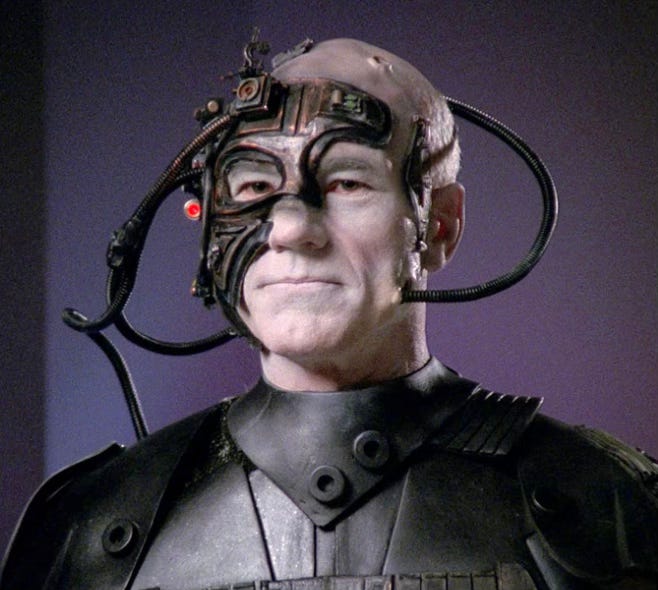Can our humanity survive the circular economy?: On edible insects, lab-grown meat and 'going green'
Technics not technology are the problem with the transhumanist economy we are building
Under Meloni, Italy has banned fake lab-grown meat, banned insects from their pasta and pizza, banned ground mounted solar panels on farmland – and threatened to pull out of WHO. Does this all amount to a based strike against globalism or a self-defeating instance of binary thinking?
It is actually a really interesting question. I will post something longer, but my immediate response is something like this.
I – Scale and subsidiarity
1. As a libertarian (albeit for families and communities rather than individuals) and as a communitarian, I don’t think the state should be banning anything. As far as possible, the regulation of behavior should come from within, as a function of decent parenting, catechesis and formation – a process that psychologists might call ‘conscience formation.’
2. It should be also directed by a broader cultural and economic landscape that establishes worthy goals for our life in common. Clearly a beautiful and sustainable landscape and ecology should be central to this because we are called to be stewards of creation. Ecological conscience formation could also be called creation-conscience formation.
3. This wider process of goal setting is simply a part of the wider problem of avoiding idolatry and living a good life. Consumerism and materialism are out. Conscious, creative, social activity and love and consideration for others are in.
4. In political-economic terms this means bending the stick as far as possible towards self-sufficient communities and families (LIVELHOOD) and away from both abstract, corporate price-setting, money-mediated (and increasingly digital) exchange (MARKET) and also the equally abstract, bureaucratic, formal-rational, impersonal processes of allocation and distribution associated with government (STATE). Catholics call this vision of political economy ‘distributism’. The central principle is ‘subsidiarity’. It doesn’t mean abolishing markets or capitalism or the state. It just means rehabilitating and defending, as far as possible, familial and neighbourly patterns of exchange and reciprocation, at the lowest possible level.
I have discussed this at greater length here
5. Pulling out of WHO is definitely a good thing on the grounds of subsidiarity, and also because of their track record and the politics of that UN/Globalist/liberal cabal associated with WEF and the EU - and because of specific failures in relation to COVID. Politically, geo-politically, economically and technologically, the world has entered a slippery upward ‘tractor beam’ – a power-grab that is intimately linked with AI and an immanent pull towards transhumanism (what
, and before him Lewis Mumford, refers to as the Machine). This is bad and as far as I can see, the quickest and most efficient route to hell that humans have yet constructed. We have been there before: the tower of Babel, Auschwitz. And possibly we can’t avoid this latest iteration of the Faustian temptation. But we can try.II – Technics: Ecology and modernism - Can we do both?
6. Banning ground mounted solar panels is stupid — because of (1) but also because pragmatically, this is a technology that can really help small farmers/communities achieve independence from corporations and the state. Banning the technology is different from regulating how it is rolled out. I have no problem with banning large corporations from buying up tracts of farmland for massive mega ‘renewable’ energy projects. I placed scare quotes around renewable because there are massive issues with the material supply chain; and until the energy storage problem is cracked, they don’t really solve ‘the problem’ - whatever that is.
7. In Lewis Mumford’s language a more precise way of talking about this is the distinction between technology and technics (Mumford, 1963). Every technology comes with a supply/production chain necessary to bring it into existence and sustain it. It is also synonymous with a specific pattern of social relationships between individuals and communities, consequent upon the way it is operated and used. Individual wage labour is part of the technics of factory production; and as socialists found out, the technics is pretty much the same whether in a state socialist or capitalist country. In the same way, modern schooling and health care has a technics, as does the military. Nuclear power necessarily involves a kind of gigantism in the division of labour and the scale of ancillary social and economic processes – not least the grid -- that distributed solar energy production doesn’t necessarily entail. This is very true of medieval windmills. It is less true of modern photovoltaics or wind-power. The sophisticated technology involved -- even with the most off-grid variants – and its dependence on rare-earth metals makes the difference between solar, wind and nuclear almost moot from this point of view.
8. Nevertheless, technics is the central concept that comes into play if you are really interested in discriminating – from a conservative, ecological or Christian perspective – between different kinds of technology.
9. The significant issue with renewables (see 3) is precisely the definition of the problem. I don’t think the environmental problem is ‘climate change‘ per se (although that IS a problem). It is idolatrous materialism and individualism and human life individually and in communities being focused on the wrong things. Single mount solar panels attached to a much more distributed and family centred form of production, in which consumption was not the overarching ‘end’ of life in common…could be good environmentally, not just because of their carbon footprint, but because of the kind of life that they underpin. In this vision, renewables could be part of a much more fractal, localized self-sufficient, community-centred, familial life oriented to God — something akin to the best aspects of the high tide of Christendom, say in France under Louis IXth as described by Andrew Willard Jones (Willard Jones, 2017)
10. Synthetic meat, insect and all the rest: Again, there is nothing wrong with the technology per se, and I don’t believe in banning things. But I do believe in corporate over-reach. If the project is to basically create a hyper-tech global ‘circular economy’ so that we can carry on our current materialist trajectory — ever more individual consumption, ever longer lives……every more control….every more abasement to ‘the machine’ (@PaulKingsnorth), then it is wrong for humanity in spiritual and religious terms (our relation with God), it’s wrong in sociological terms (our relation with each other), wrong in natural terms (our relation with nature) — and it won’t work as a form of environmental problem solving. The crux is whether families and communities are able to choose and use technology to further a kind of empowered localism with as little State and Market as possible; or whether the technology is used as a cudgel to enforce the trajectory of global modernism i.e. transhumanism, AI, corporate integration and state control over a society of hyper-mobile, alienated, billiard ball individuals.
11. Ecomodernism versus ecological localism: Since its heyday in the 1970s, the green movement has been split between two radically different visions – entailing different metaphysics and teleologies. These are broadly ecological modernism versus localism. Eco-modernism accepts the logic of the Machine and the technics of modern civilization as neutral or even benign aspects of a taken-for-granted modernity. The Promethean/Faustian logic of capitalist modernization is not up for debate, nor the underlying materialist/naturalist understanding of the universe. Eco-modernism views the biosphere as a machine and the function of environmental governance as constructing a ‘sustainable’ industrial metabolism that reconciles the energy /material flows of the global economy with those of the natural world.
12. The subsidiarist ‘small is beautiful’ kind of green politics that Brits will always associate with (the beautiful, home-schooled in India – and my first crush) Felicity Kendal and The Good Life; the vision that animated Lady Balfour and the early organic farming movement — stands in antipodean contrast to ecomodernism.
This is because it was oriented to completely different ends. Most greens are unaware of it, but the thought leaders of the early green movement were nearly all proponents of some sort of natural law. Schumacher, Boulding, Daly, Tolstoy were all Christians; Gandhi was a practicing Hindu.
See here
and here
and here
13. So, whether synthetic meat and industrial production insect protein are good depends largely on the societal and spiritual ends to which they are directed and the technics that would be brought into being by their adoption.
III – The technics of the circular economy
14. In very broad terms, the ‘technics of the machine’ – if not individual machines – maps fairly intuitively onto the left-brain mode of thinking described by Iain McGilchrist (here
); the ‘sincerity’ modality that Adam Seligman contrasts with the ritual/comic/ludic frame. It is narrowly instrumental and involves the elaboration of a bureaucratic formal rationality that Max Weber had in mind when he described modernity as an ‘iron cage’.15. Much of sustainability thinking is directed towards what is called the ‘circular economy.’ In nature, metabolism – the processing of energy, materials and waste – tend to involve nested and endlessly cyclical systems and subsystems. These are bundled – mainly for our cognitive convenience – into identifiable units. The easiest of these to grasp are like us – bounded organisms, from single cells right through to massive animals. However this boundedness is both important and misleading. Just as multicellular organisms involve the cooperation of billions of cells, ‘species’, ‘ecosystems’ and even the whole biosphere involve closely interdependent subsystems exchanging energy, materials and information across semi-permeable barriers (which could be nuclear or cellular membranes, skin or bark, the edge of a coral reef, a river, an ocean or the atmosphere). Metabolism in the material world involves exchange across boundaries and membranes. The ontological perimeter of any ‘thing’ is never as simple as when philosophers say look at this ‘table’. We focus on bounded entities like ‘tables’ and ‘horses’ or that ‘BMW motorcycle’ because, intuitively, we are projecting a kind of existential integrity that we experience as bounded selves. Oftentimes in ecology and biology, this expectation of straight forward ‘boundedness’ is misplaced, or at least obscures ‘units of analysis’ that are bounded in different temporal or spatial terms at levels of integration that are less easily comprehensible. A ‘species’ is not a ‘thing’. It may include dozens of interbreeding subspecies, the most distantly related of which can’t themselves breed together. Seen over evolutionary time, the same entity may change radically.
OK - so all well and good. What does this have to do with the price of eggs? Although the temporal, spatial, physical, and functional parameters of an entity may be negotiable for the way we see things ‘out there’ — for human beings they are not. We project such coherence so easily precisely because we have souls. We are spiritual entities created in the image of God — and our ‘selves’ in this sense are very much defined by our incarnate bodies. We are spiritual AND somatic. Any project that starts to render human beings as cogs in the machine — literally in Charlie Chaplin’s Modern Times — is tantamount to the abolition of man (to use C.S. Lewis’ formulation for the problem).
It doesn’t matter whether the machine is of metal and plastic, or some global, geo-engineered biological earth system managed by the techsperts of the 4th Industrial Revolution.
Any transhumanist project that undermines our integrity as choosing, accountable, sinful but redeemable agents — is both diabolical and doomed to failure.
16. Human systems have been more or less circular. Civilizations and especially industrial civilization, tend towards one-way linear flows. The price of social complexity is a large flow of energy and materials, the production of enormous amounts of waste and the production of ‘entropic disorder’ which is exported to the wider biosphere. This is evident in species loss, climate change, ecosystem disruption and pollution -- but also ‘entropic dissipation’ i.e. the transformation of high-grade elements and ores into low grade wastes from which it is incredible expensive and uneconomic to re-extract resources (think about the rare earth metals leached into the sea or lost in landfills). One of the greatest examples – which could turn out to be existential is the dependence of modern agriculture on a finite supply of mineral phosphorus (mostly in Canada and Morrocco) – which is being leached at an incredible rate, via our farms and soils and human sewage, into the sea – never to be harnessed again.
17. Clearly, from this perspective, the circular economy must be a priority. The older green way of thinking about this – permaculture, organic agriculture, ‘small is beautiful’ – centred on recovering the rotational system in agriculture and the reinstitution of small mixed family farms. The reason for this is that with local, fractal, family-based agriculture it is much easier to cycle wastes as inputs. On a traditional farm, cow shit can fertilize an arable field. With an industrial dairy, bovine slurry becomes a hazardous waste. This is the vision that underlies the Christian libertarian vision of Joel Salatin (the ‘lunatic farmer’). If you want a guru with a beautiful vision and a practical technical ‘can-do’ mentality and know-how, he is your man.
18. The more sophisticated society becomes, the more technical the project of circularity must be. Matching the molecular level cycling and recycling that goes on tens of thousands of times a second in every cell in your body, and simultaneously across centuries and millennia with the ecology of prairies, forests, oceans or even millions of years with continent formation – this would involve incredible technological sophistication and the emergence of a kind of meta information system – an industrial autonomic nervous system – that is on the same scale as global civilization.
19. In principle, if one could develop such a system, I suppose it might be a good thing. But in practice it is horrible. Firstly, this is because it would unavoidably involve a kind of controlling giganticist corporate politics of the sort championed by the most dangerous proponents of the 4th industrial revolution (Claus Schwab at the World Economic Forum). Their preoccupation with digital identities, digital currencies and ‘big data’ is not accidental. If the scale of the metabolism is correlated with the scale of the organism, a global circular economy of the sort that they envisage, would necessarily mean a kind of global organism. This is perhaps what James Lovelock envisaged when he talked, in The Revenge of Gaia of an ecological civilisation. However, be warned. Lovelock also pointed out that to the extent that the biosphere guided by human reason becomes an organism in its own right, individual humans become reduced in status to ‘parts’ of the whole – think about individual neurones in relation to the brain. He likened this emerging situation to something like the role of worker bees in a hive.
Social insects such as bees, hornets, ants and termites evolved to form nests-communities far stronger than crowds of individuals – but in doing so they lost personal freedom and became subjects of their queens. Perhaps in a similar way we would lose freedom at the same time that Gaia gained strength . . . We cannot now know the chances of this happening, how long it will take or what it will be like to be a Gaian subject. The only near certainty is that we will never evolve this way if we allow ourselves, through inaction or improper response, to be made extinct by global heating . . . Let us look ahead to the time when Gaia is a truly sentient planet through the merging with her of our descendents. (Lovelock, 2009: 161–2)
Perhaps we will indeed ‘lose freedom’ as Gaia gains in strength — and very much so if the source code for Gaia is written by the World Economic Forum.
20. Communist fantasies have always involved to some extent embraced this dissolving of the individual into the collective. Katharine Janeway’s Startrek dramatized it with the ‘Borg’.
Aldous Huxley’s Brave New World anticipated a future in which the telos of humanity had been reduced to something like pleasure with the absence of pain — which of course resulted in the complete destruction of individual worth. Modern western societies are already well on the way to this transhumanist future with the development of MAID programmes.
21. As Lovelock pointed out, there is nothing ‘unnatural’ per se about this. His colleague, Lynn Margulis, famously challenged neo-Darwinian orthodoxy by pressing the case for symbiogenesis – the view that evolutionary novelty comes mainly from cooperation and the coming together of lower-level units to form higher level systems. The energy processing mitochondria and chloroplasts – the most perfect instantiations of the circular economy, with their high frequency AtP/ADP chemical-energy cycling – which define the metabolism of all complex ‘eukaryotic cells’ are now recognised as the product of an ancient merging of separate cells. Instead of being consumed, the ancestral mitochondrial or chloroplastic cells become part of the internal machinery of their would-be nemesis. Cell-biology aside, think about what that means. The simpler cells all lost their individual autonomy, identity and telos, in favour of some emergent, higher-order entity; just as asexual worker bees are subordinated to the logic of the hive; or the free-thinking sovereign citizens of the Federation are threatened with assimilation by the Borg.
22. Christianity is predicated on Imago Dei. From this point of view, the logic of transhumanism is diabolical and evil. It is as simple as that. Human beings are to be judged in the light of their potential as sovereign individuals. The machine logic of an ‘ecological civilization’ – however benign in terms of reconciling the metabolism of the biosphere and global industrial system – is abhorrent the moment it abrogates our dignity and potential for self-actualization as individuals created in the image of God. This applies to A.I., to cyborg enhancements and to the mesh of big-data digital information networks that would form our actions, behaviour and conscience from without, automatically and without human empathy or feeling – rather than in relation with other people, with our immediate and local natural world, and with God.
IV – Conclusion: What does this say about the technics of the circular economy?
Writing in the late 1960s in a book called The Environment Game, Nigel Calder imagined what the world would be like if we could produce synthetic animal protein using just solar energy, and if every architectural surface was clothed in ‘artificial leaves’ -- such that just like plants, buildings and roads would become self-sufficient in energy. Against the backdrop of a rising hysteria about over-population and very real concerns regarding the massive loss of natural ecosystems, Calder even went so far as to imagine moving human population onto vast self-sufficient floating ocean cities (influenced probably by the arcologies of Paolo Soleri). This he speculated could leave the land free for the recovery of terrestrial ecosystems. Wolves and bison would once again roam the English south downs. Great forests would crawl back over the landscape – providing wilderness resources for spiritual recuperation.
If you hold to the eco-modernist vision whereby the ‘health’ of the biosphere and the continuance of a complex civilization are to be the twin defining imperatives, then Calder’s vision sounds exciting – enticing even. The wild bit of the biosphere is rescued by taking humanity out of it all together. Humanity is rescued by developing what, in another life, I once referred to as ‘trophic detachment’. Ultimately, this trajectory would have humanity sustaining itself, perhaps out in space, within completely detached, circular, self-sufficient artificial metabolic worlds (of the kind envisaged by the 1970s Biosphere II experiment). This is the trajectory of hard-science fiction. But for it to have legs would mean subordinating individual humans – our personhood – to the machine. Hence the link with transhumanism.
Ironically, this eco-modernist vision of sustainability would also necessarily involve the complete control and subordination of the Earth. The 4th industrial revolution of the World Economic Forum is indifferent to Creation and – in order to sustain this brave new meaningless trajectory of materialist species self-actualization, would inevitably need to quantify, model and control the energy, material and information flows of the biosphere. The biosphere could never be separate – unless perhaps we did leave – but would, inverting the existing relationship, become a function or an appendage of the ‘anthroposphere’.
With this in mind, would I ban fake ‘lab grown’ meat? Or exclude insect protein from pasta and pizza? Would I ban ground mounted solar panels on farmland? What about pulling out of WHO?
The last question is the easiest. Yes, I would withdraw from all United Nations organizations and see the construction of more modest institutions focused purely on geopolitical order and humanitarian assistance, with the emphasis on regional bilateral aid. The UN, UNESCO, WHO have become illegitimate cudgels for a part particular globalist and modernist agenda to which I object most strenuously.
Insect protein in pizza and flour? Yes I would ban any adulteration of natural products that infringes the consumer’s right to choose. GMOs are now so much part of the food chain in North America that it is almost impossible to avoid them; and as a result, there is growing evidence that people are becoming sick. I don’t care if people want to culture insects and eat them, or to sell insect products. The problem is all about the technics and not the technology: the scale of production, the scale of regulation and corporate monopoly. The same is true of lab-grown meat.
In short, Meloni is focused on the wrong strategy. She should invert the regulatory pyramid to give a structural and permanent advantage to small scale, family and community level production. There should be zero tax and zero regulation on farm-gate production, processing and sales. And the object of this policy should only secondarily be about ‘economic growth’. Rather it should be about maximising the capacity of place-bound families and communities to form well-rounded sovereign individuals who are able to maximise their potential as rational, choosing creatures created in the image of God.
References
Mumford, L. (1963). Technics and civilization. –. Harcourt, Bruce & World.
Willard Jones, A. (2017). Before Church and State: A Study of Social Order in the Sacramental Kingdom of St. Louis IX. Emmaus Academic.













